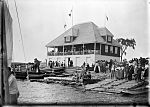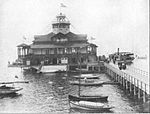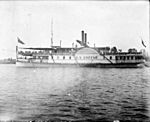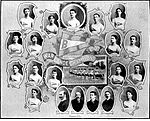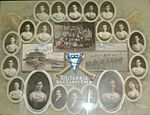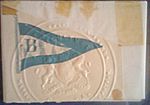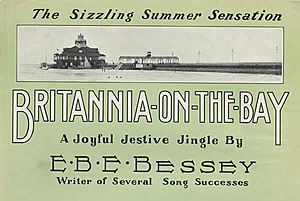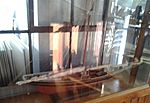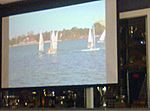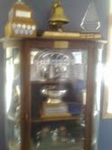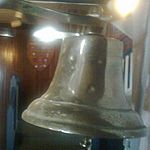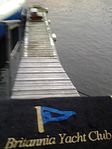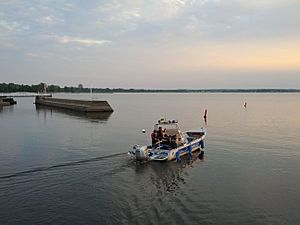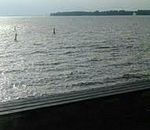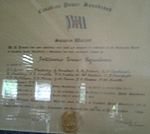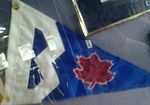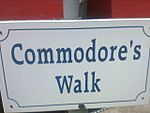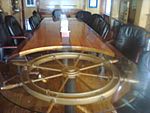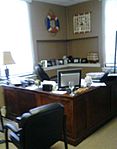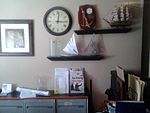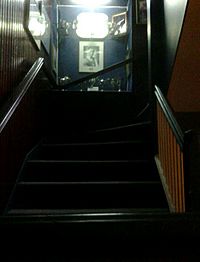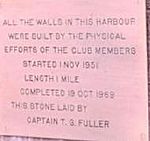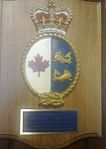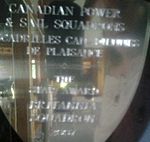Britannia Yacht Club facts for kids
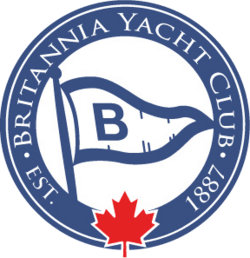 |
|
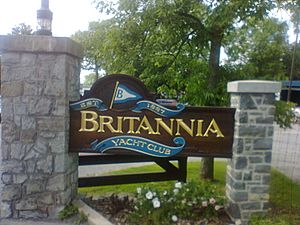
Britannia Yacht Club gates
|
|
| Abbreviation | BYC |
|---|---|
| Formation | 1887 |
| Legal status | active |
| Purpose | advocate and public voice, educator and network for Recreational boating, and competitive sailors, coaches, volunteers and events |
| Location | |
|
Official language
|
English, French |
|
Commodore
|
Rob Braden |
| Affiliations | Advantage Boating; Canadian Canoe Association, Canadian Dinghy Association, Canadian Power and Sail Squadrons, Canadian Yachting Association, Armdale Yacht Club, Bay of Quinte Yacht Club, Dartmouth Yacht Club, Dobson Yacht Club, Island Yacht Club, Kingston Yacht Club, National Press Club, Nepean Sailing Club, Oakville Yacht Squadron, Pointe-Claire Yacht Club, Queen City Yacht Club (Toronto), Rockcliffe Yacht Club, Royal Canadian Yacht Club, Royal Hamilton Yacht Club, Royal Lake of the Woods Yacht Club, Royal Nova Scotia Yacht Squadron, Royal St. Lawrence Yacht Club, Royal Vancouver Yacht Club, Tennis Canada |
The Britannia Yacht Club (BYC) is a special club in Britannia, a neighborhood in Ottawa, Ontario, Canada. It's a private social club, a yacht club for boats, and a tennis club. It was started in 1887 by people who had summer cottages nearby.
The BYC is located on a piece of land at the eastern end of Lac Deschênes, close to the Deschênes Rapids on the Ottawa River. The club leases land from the National Capital Commission. The harbor was built from an old power canal and has been made bigger twice. The water level in the harbor is controlled by a system of logs at its entrance.
The BYC is part of the Ontario Sailing Association, Canadian Power and Sail Squadrons, and the Canadian Yachting Association. The club's leaders include a Commodore, Vice-Commodore, Rear-Commodore, Secretary, and Treasurer.
Contents
What the Club Offers
The BYC is listed as a sports facility by the City of Ottawa. It gives members access to 45 kilometers of sailing waters on the Ottawa River. There's even a special map, Chart 1550, that shows the whole area.
The BYC has nearly 1,200 members who enjoy social events and boating. The club has a marina with two harbors that can hold 280 Keelboats (boats with a heavy fin underneath). For smaller dinghy boats, there are dry storage areas. The BYC also offers Tennis, youth programs, and many social activities.
At the entrance to its harbor, called Sherwood Port, there's a plaque honoring Justice Lilius Anglin Sherwood. He was a judge and a sailor who helped with international sailing events. The main harbor connects to the Ottawa River and is surrounded by Mauve Cove, Crimson Cove, and Blue Lagoon. The inner harbor is surrounded by Emerald Cay, Mauve Cove, and Crimson Cove. On land, there's a special area just for members and a camping spot on Baskin's beach.
The Clubhouse has cool areas like the dragon sailboat bar, Main Lounge, Bruce Neuk, and the Sunset Room restaurant. These spots are great for casual meals, fancy dining, and social gatherings. Fuller Park is another popular spot for picnics.
Beautiful Gardens
The BYC has many lovely gardens and wildflower gardens. There are also Waterways and Walkways with lots of plants. Many of these plants are in the club's colors: blue and white.
Club History and Fun Facts
Long ago, in the 1830s, steamboats traveled up the Ottawa River. By the 1870s, Britannia Village was a popular summer spot for people from Ottawa. Train tracks were built, connecting Britannia to the city.
How the Club Started
The club started around 1887 as the Britannia Aquatic Club (BAC). It used a converted sawmill as its main building. In 1892, the BAC changed its name to the Britannia Nautical Club (BNC). This club wanted to encourage all kinds of water sports, like sailing, paddling, and rowing. They even held races!
In 1895, the club became the Britannia Boat House Club. They held their first yearly race that year. A sad event happened in 1895 when four young members drowned. Because of this, the Edward Miall award was created to encourage junior members to improve their skills and stay safe.
The club grew quickly, and a new clubhouse was opened in 1896. This new building was closer to the Deschênes Rapids. A famous steamboat called the G.B. Greene used to take passengers on fun trips up the Ottawa River from Britannia. Its anchor is still at Britannia Beach today!
In 1898, the Britannia Boat House Club's War Canoe team won the Canadian National Canoe Championship. This was a big deal!
The Club Grows
Around 1900, a streetcar line was built to Britannia, making it easy for many people to visit. Britannia became a popular summer resort with an amusement park. An unfinished canal from a power project was later used in 1951 to create the BYC's protected harbor. Today, this harbor has many spots for boats and offers fuel.
The Britannia Boat House Club was one of the founding clubs of the Canadian Canoe Association in 1900. They hosted many championships over the years. In 1902, a brave 15-year-old named Lewis Skuce saved two people whose canoe was drifting towards the rapids.
A new clubhouse was built in 1905-06. In 1905, the club changed its name again to the Britannia Boating Club. They focused on racing and using all types of boats. The Edwin L. Brittain Trophy, first given in 1905, is still awarded for a race to Pinhey's Point and back.
During the First World War, the club helped with the war effort. They hosted events to raise money for soldiers. Sadly, the clubhouse and many boats were destroyed by a fire in 1918. The club moved back to its current location in 1920.
In 1924, the Ladies Auxiliary of the Club was formed. The BYC started its first tennis season in 1926 with clay courts. The club even had successful water polo and basketball teams in the late 1920s.
The club faced tough times in the early 1930s but managed to stay open. In 1936, a paddler sponsored by the club, Frank Amyot, won Canada's first gold medal in paddling at the Olympics in Berlin!
During the Second World War, the club continued to be a place for recreation. In 1944, a cabin at Britannia Bay provided a summer home for Royal Canadian Air Force women. In 1945, the club celebrated its 50th anniversary with a fun cabaret.
In 1946, the Britannia Boat Club hosted the first Canadian Dinghy Association Regatta. A memorial park was also created to honor club members who died serving overseas.
The Britannia Yacht Club Today
In 1950, the Britannia Boating Club was officially renamed The Britannia Yacht Club Inc. At this point, competitive paddling and rowing were replaced by a focus on sailing.
In 1952, the Junior Sailing Squadron was started, helping young people learn to sail. The club has hosted many important events, including the first annual National Capital Regatta in 1957.
In 1967, as part of Canada's 100th birthday celebrations, Prince Philip, Duke of Edinburgh, visited the BYC for the Duke of Edinburgh Regatta. He even presented a trophy to the winner of a sailing race.
In 1969, a brass plaque was placed on the BYC harbor. It honors the club members who worked hard to build the harbor walls between 1951 and 1968.
All-weather tennis courts were installed in 1973. The club has hosted many tennis tournaments, including those for veterans, wheelchair tennis, and junior championships.
In 1983, new gates were built at the entrance to the BYC harbor. In 1994, the club's Dragon Lounge bar was made from an actual dragon sailboat named 'Magic Dragon'.
In 1995, the BYC celebrated its 100th anniversary. They also started their first annual Duct tape challenge, where people build boats out of cardboard and duct tape and race them!
In 2004, the BYC won the William Abbott Senior Trophy for having the best Sail Training Program of the Year. In 2008, the club was chosen as one of ten Development Training Centers for top sailors in Ontario.
In 2012, to celebrate its 125th anniversary, the BYC placed a time capsule in the clubhouse wall. It will be opened on the club's 200th anniversary! The clubhouse has also been part of Doors Open Ottawa, allowing the public to explore its historic architecture.
BYC Traditions and Fun Facts
The BYC has a collection of model yachts, including a model of the famous Bluenose II.
Members fly the club's special triangular flag, called a burgee.
Every year, members take part in the Commodore's sail past and the Commodore's ball. On Venetian night, boats in the harbor are decorated with lights, making a beautiful display.
Members even sing a BYC version of the song Rule, Britannia!.
The club's colors are Blue and White . You can see these colors in the clubhouse, gardens, and even on members' clothing.
The clubhouse and gardens have memorials to members who helped the BYC. For example, the Harbormaster's Gate honors Vice-Commodore Lorne E Minogue and all members who volunteered their time to build the club.
If you ring the "temptation bell" at the dragon bar, it means you're buying a round of drinks for everyone there!
The Nepean Sailing Club donated a trophy case to the Britannia Yacht Club during its 100th anniversary.
Library and Archives
The Joan Hickman Memorial Library has books, videos, and magazines about sailing. The BYC also keeps old records like race programs, photos, scrapbooks, and letters. These items tell the story of the Britannia Yacht Club and its earlier names. The BYC photo archives have pictures from the 1880s to today.
Activities: Boating, Racing, and Tennis
The BYC organizes sailboat races in the Ottawa area. Boating activities include rowing, paddling, sailing, windsurfing, fishing, and using motorboats for water-skiing or wakeboarding. Members enjoy racing, cruising, and day sailing for fun. Sometimes you might even see a Sea-doo or Jet-ski.
Types of Boats at BYC
The BYC has seen many types of boats over the years, both old and new. These include brigantines, canoes, catamarans, dinghies, Dragons, keelboats, sailboats, sailboards, Sharks, and War Canoes. You can also see displays of radio-controlled boats.
Club members own many different kinds of boats, such as 420s, Albacores, Catalina 22s, Hobie Cats, Lasers, Optimists, and Sunfish. The Ottawa Police Service's Underwater Search and Recovery Unit and Marine Unit also operate from the BYC.
Training Boats
The club has used different types of boats for training over the years:
- The International 14 (dinghy) was introduced in 1943.
- The Lightning (keelboat) came to BYC in the 1950s.
- The Y flyer was used for racing and training from 1955 to 1970.
- The Wayfarer (dinghy) has been used since 1963. In 1964, a BYC member won the Wayfarer racing North American Championship!
- The Shark (keelboat) has been used for racing and training since the 1970s.
- The Laser (sailboat), designed by former BYC member Bruce Kirby (yachts), has been used in the Olympic Games since 1996.
Sailing Races
The BYC organizes many sailboat races. These include races for dinghies, windsurfers, multihulls, and yachts. There are different types of races like fleet racing, match racing, and team racing.
The BYC has several racing groups for specific boat types, like the 420, Laser, and Optimist. The club holds races on weeknights from April to September and several weekend races each year. There's also a program for members who enjoy cruising (sailing for fun, not racing).
The sailing season runs from mid-April to late October. During the summer, there are sailing training programs for both kids and adults.
Every year, the club hosts big races that bring sailors from all over Canada and other countries. The BYC often works with the nearby Nepean Sailing Club and Club de Voile Grande-Rivière for these events. They also organize fun sailing events to remember members who served in the Canadian Forces and to raise money for local charities.
Tennis at BYC
The BYC has a great tennis program. In 2012, they held a Junior Tennis Tournament for players 14 and under. Group lessons are free for BYC members, and beginner lessons are offered weekly.
Working with Others
The Britannia Yacht Club helps maintain the lights and buoys in its area of the Ottawa River. Other groups like Parks Canada and local clubs also help with navigation aids on the river. Green buoys are on the left side, and red buoys are on the right side when entering a harbor.
Other yacht clubs on Lac Deschênes include the Nepean Sailing Club and Club de Voile Grande Riviere. The BYC has agreements with other yacht clubs, allowing members to visit each other's clubs.
The BYC works with the Nepean Sailing Club to promote sailing in Ottawa. They also partner with the Britannia Village Community to put on fireworks shows for Victoria Day and Canada Day.
The Ottawa Power and Sail Squadron (OPSS) teaches boating safety and navigation. The BYC hosts their graduation ceremonies. The BYC is also active with the Canadian Yachting Association and the Ontario Sailing Association, helping to train athletes and coaches.
How the Club is Organized
The BYC is a non-profit organization. It has rules and procedures, just like any other club. Because of its connection to the sea, the club uses naval terms for its leaders. For example, the main leader is called the Commodore. The person in charge of land activities is the Vice Commodore, and the person in charge of water activities is the Rear Commodore (also called the Harbourmaster).
The club has different committees for things like House and Grounds, Tennis, Membership, Youth, and Social events. There's also a Club Manager who handles the daily operations and works with the Commodore.
The Britannia Yacht Club Foundation was created in 2010 to support the club.
The Commodore's boardroom table has a ship's wheel from the G.B. Patee II boat. This room also has a large library of books about boats and sailing.
The club's official newsletter is called the Full and By. This sailing term means to sail as close to the wind as possible with all sails full.
Famous Members
Many notable people have been part of the BYC:
- Frank Amyot: Canada's only gold medal winner from the 1936 Summer Olympics in paddling.
- Josle Braden: The first female Commodore at BYC, serving from 1992–1993.
- Thomas G. Fuller: A war hero and founder of a construction company.
- Bruce Kirby (yachts): A famous sailor and boat designer.
- J.E. Stanley Lewis: A member of the war canoe team who later became mayor of Ottawa.
- Don McDiarmid: Canada's top singles tennis player in the 1930s.
- Harvey Pulford: Achieved national success as a paddler with the club.
- Hon. Justice Livius Anglin Sherwood: A former BYC Commodore, founder of the junior sailing program, and an international sailing judge for many major events.
- Roderick Percy Sparks: A former Commodore and environmentalist known as the 'father of' Gatineau Park.
Club Leaders (Commodores)
Here are some of the Commodores who have led the Britannia Yacht Club and its earlier versions:
Britannia Yacht Club
- Rob Braden (Current Commodore)
- Phil Moorman (2012-2011)
- Konrad Lewinski (2011-2012)
- George Clayburn (2008-9)
- John Irvin (2006-7)
- Lynn DeL'orme (2004)
- John Vines (2002)
- Paul Dalahay (2000-1)
- Kirk Robertson (1998-9)
- Rosemary MacKillop (1996-97)
- Simon Fuller (1995)
- Josle Braden (1993)
- Larry Bradley (1991)
- Dennis Foy (1989)
- Ian Anderson (1987)
- Commodore Denny (1986)
- David Brown (1983)
- William Wright (1982)
- Philip Brule (1980)
- A.R. Vanderbelt (1978)
- Blair Cooke (1976)
- Walter Blandy (1974)
- Osie Blouin (1971)
- John Killick (1970)
- Thomas E. Appleton (1966-67)
- Livius A. Sherwood (1964-65)
- James A.S. Milne (1962-63)
- Lorne Smith (1961)
- Gordon Foy (1959-60)
- Grover Book (1957-8)
- Earl Checkley (1956)
- Reg A.S. Bruce (1954-55)
- A.N. Hudleson (1953)
- Earl Checkley (1951-2)
- Cameron Jones (1950)
Britannia Boating Club
- Thomas G. Fuller (1948-49)
- Allan Jacques (1947)
- Don Kirby (1946)
- Reg A.S. Bruce (1945)
- L.P.R. Cook (1938-44)
- F.A. Skuce (1935-37)
- D.L. Fenton (1933-34)
- David P Kirby (1930-32)
- A.J. Fraser (1928-9)
- T.D. Higginson (1928)
- T.A. Burgess (1927)
- T.S. Kirby (1920-26)
- T.A. Burgess (1918-19)
- Guy Boyce (1916-17)
- E.R. McNeil (1914-15)
- Roderick Percy Sparks (1910-13)
- E.L. Donnelly (1906-9)
- William Rowatt (1905)
Britannia Bay Boathouse Club
- E.L. Brittain (1904)
- William Wyld (1902-3)
- Arthur Tache (1901)
- William Percival (1900)
- Ezekiel Stone Wiggins (1899)
- William Wyld (1896-8)
Britannia Nautilus Club
- E.D. Parlow (1894)
- Geo Howe (1892-3)
Awards and Recognition
The BYC has been a leader in teaching sailing for many years.
The Britannia–Rideau Power & Sail Squadron helps make boating safer through education. Volunteers teach courses on boating and navigation.
In 2004, the BYC won the William Abbott Senior Trophy for having the best Sail Training Program of the Year.
The BYC has also helped develop many competitive sailors. In 2008, it was chosen as one of ten Development Training Centers where top sailors train.
 | James Van Der Zee |
 | Alma Thomas |
 | Ellis Wilson |
 | Margaret Taylor-Burroughs |


